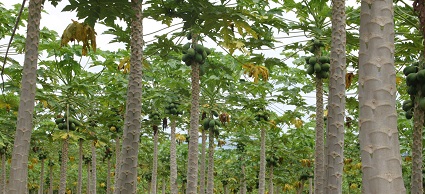Ensuring food security through the management of the papaya mealybug menace in Ghana

(2014) The agricultural sector is the most important in the Ghanaian economy. It contributes up to 35% of GDP, employs about 60% of active labour force and accounts for 60% of foreign exchange earnings. Fruits such as mango, papaya and pineapple account for the main part of exports and contribute to create employment, fiscal revenue and foreign exchange to the Ghanaian economy.
Papaya is cultivated on a large scale in the four Ghanaian regions of Greater Accra, Central, Eastern and Volta and it is widely recognized to have an increasing export potential. However, papaya production is constantly challenged by the persistent attack of insect pests both on the field, during transportation and in storage. In particular, a new invasive species known as the papaya mealybug (Paracoccus marginatus) has been identified by the International Institute for Tropical Agriculture to have affected papaya crops since 2009.
As a result of this infestation, around 85% of cultivations in 2009 have been destroyed and thousands of employees in the sector lost their jobs. Furthermore, the pest infestation caused a 65% reduction in the 2009 export level compared to the previous year.
Addressing the menace FAO collaborated with Ministry of Food and Agriculture to manage the situation using the consolidated technique of biological control. The project was designed to strengthen mealybug management capacities of the recipient farmers as well as of personnel of the Plant Protection and Regulatory Services Directorate (PPRSD) of Ministry of Agriculture.
With effective papaya mealybug control system put in place, the project has contributed to reduce crop losses by 100% in the four affected regions and has helped farmers to meet international demand for papaya. Ghana is then expected to regain its position as the fourth largest papaya exporter. It will further enhance employment opportunities among local population and will constitute effective mechanisms for ensuring poverty reduction among farmers in these regions. FAO’s intervention was therefore to provide farmers and PPRSD with resources and expertise to effectively manage the outbreak of papaya mealybug pest through training and capacity building using suitable equipment and sustainable supply of mother-cultures of bioagents.
FAO invested in laboratory equipment and materials to provide the PPRSD with a well-functioning environment in which to rear and maintain the bioagents. Laboratory equipment and materials complemented and strengthened the impact of capacity building activities towards increaseed response to pest outbreaks. FAO also invested in creating awareness and build capacity among farmers on Papaya Mealybug management organizing trainings for harvesting and release of bioagents.
Approximately 2510 papaya producers were affected by the menace, these farmer have been directly involved in the project’s activities. Greater Accra, Eastern, Volta and Central Regions in Ghana are the main papaya growers’ areas in the country. Papaya cultivation represents the main source of income for the farmers of these regions.
The growing international demand from Europe represents a high economic potential both for farmers and traders. Furthermore, papaya plays an important role in enhancing food security at local level.
Civil servants within the National Plant Protection Organization of Ghana and within the Plant Protection and Regulatory Services Directorate of MoFA have also increased their expertise in effective papaya mealybug pest control. MoFA have received more technical equipments and materials as to enhance pest control capacity for future papaya mealybug outbreaks
There is abundant empirical evidence showing that biological control is among the most cost-effective methods of pest control. Other than the initial costs of collection, importation, and rearing, little expense is incurred. The natural enemy rarely requires additional input and it continues to kill the pest without any human intervention.
The project was complete in consonance with the development policy of the Government of Ghana and the Ministry of Food and Agriculture’s priority programme for boosting agriculture in rural areas. The selection of agriculture as one of the priority areas of the government and its commitment to ensure all-year farming and Government’s focus on agriculture as the key to growth and poverty reduction are additional elements that point to the long-term sustainability of the project Introduction and release of bioagents have proved to be a successful means to control the pest, hence the paramount importance to provide national laboratories with the equipment and technical expertise to rear and to mass produce effective bioagents, and FAO has supplied such equipments for a greenhouse laboratory at PPRSD to facilitate a sustainable production of the bioagents.
Capacity building activities, as well as awareness-raising would continue to be of paramount importance to provide farmers with effective tools to rapid response to future outbreak of papaya mealybug pest.
